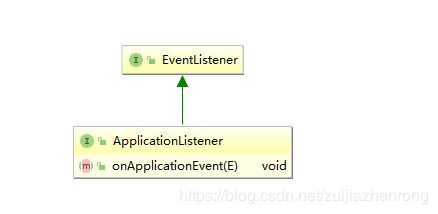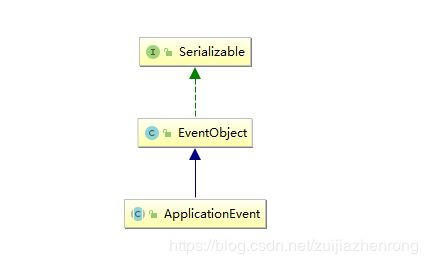Spring的事件驱动模型
Spring事件驱动模型的三个概念:事件,事件监听者、事件发布者。
事件:如下图所示,Spring中定义了事件的抽象类ApplicationEvent,该类继承自JDK的 EventObjectl类,ApplicationEvent中的timestamp字段用来存储事件发生的时间戳,父类中的source表示事件发生的对象。当我们要定义时间的时候只需要继承ApplicationEvent,如下面自定义的PublishEvent事件
//自定义事件
public class PublishEvent extends ApplicationEvent {
private String name;
public PublishEvent(Object source) {
super(source);
this.name = (String) source;
}
@Override
public String toString() {
return "PublishEvent{" +
"name='" + name + '\'' +
'}';
}
}
事件监听者: 事件监听者负责监听和处理事件,如下图所示,Spring定义了事件的监听接口ApplicationListener,该接口继承自JDK的EventListener接口,并且ApplicationListener规定了onApplicatioEvent(E)函数的参数必须为ApplicationEvent的子类,所以每个时间监听者都只是针对某个ApplicationEvent的子类的监听。

//自定义时间监听者
public class EventListener implements ApplicationListener {
public void onApplicationEvent(PublishEvent publishEvent) {
System.out.println("EventListener>>>>>>>>>>>>"+publishEvent.toString());
}
}
事件发布者:事件发布者的作用显而易见,就是发布事件,将事件交给对应的发布者处理,那么Spring是如何做到的呢? 我们来看下图。Spring定义了ApplicationEventPublisher接口和ApplicationEventMulticaster接口。ApplicationEventPublisher用来发布事件,ApplicationEventMulticaster是用来维护事件监听者和将事件多播给事件的监听者,其实事件的真正发布就是在ApplicationEventPublisher的multicaster方法中实现的。
实现原理:
ApplicationEventPublisher的publishEvent的实现是在AbstractApplicationContext中事件的,代码如下:
protected void publishEvent(Object event, @Nullable ResolvableType eventType) {
Assert.notNull(event, "Event must not be null");
if (this.logger.isTraceEnabled()) {
this.logger.trace("Publishing event in " + this.getDisplayName() + ": " + event);
}
Object applicationEvent;
if (event instanceof ApplicationEvent) {
applicationEvent = (ApplicationEvent)event;
} else {
applicationEvent = new PayloadApplicationEvent(this, event);
if (eventType == null) {
eventType = ((PayloadApplicationEvent)applicationEvent).getResolvableType();
}
}
if (this.earlyApplicationEvents != null) {
this.earlyApplicationEvents.add(applicationEvent);
} else {
//调用ApplicationEventMulticaster的实现类SimpleApplicationEventMulticaster的multicastEvent方法多播事件
this.getApplicationEventMulticaster().multicastEvent((ApplicationEvent)applicationEvent, eventType);
}
if (this.parent != null) {
if (this.parent instanceof AbstractApplicationContext) {
((AbstractApplicationContext)this.parent).publishEvent(event, eventType);
} else {
this.parent.publishEvent(event);
}
}
}
SimpleApplicationEventMulticaster中的相关代码
public void multicastEvent(ApplicationEvent event, @Nullable ResolvableType eventType) {
ResolvableType type = eventType != null ? eventType : this.resolveDefaultEventType(event);
//得到event的集合
Iterator var4 = this.getApplicationListeners(event, type).iterator();
//遍历集合执行调用
while(var4.hasNext()) {
ApplicationListener listener = (ApplicationListener)var4.next();
Executor executor = this.getTaskExecutor();
if (executor != null) {
executor.execute(() -> {
this.invokeListener(listener, event);
});
} else {
this.invokeListener(listener, event);
}
}
}
protected void invokeListener(ApplicationListener listener, ApplicationEvent event) {
ErrorHandler errorHandler = this.getErrorHandler();
if (errorHandler != null) {
try {
this.doInvokeListener(listener, event);
} catch (Throwable var5) {
errorHandler.handleError(var5);
}
} else {
this.doInvokeListener(listener, event);
}
}
private void doInvokeListener(ApplicationListener listener, ApplicationEvent event) {
try {
//最终调用listener的onApplicationEvent方法
listener.onApplicationEvent(event);
} catch (ClassCastException var6) {
String msg = var6.getMessage();
if (msg != null && !this.matchesClassCastMessage(msg, event.getClass().getName())) {
throw var6;
}
Log logger = LogFactory.getLog(this.getClass());
if (logger.isDebugEnabled()) {
logger.debug("Non-matching event type for listener: " + listener, var6);
}
}
}
编写测试用例,在用例中我们注入ApplicationEventPublisher
@SpringBootTest(classes = Application.class)
@RunWith(SpringRunner.class)
public class EventTest {
@Autowired
private ApplicationEventPublisher applicationEventPublisher;
@Test
public void testEvent(){
PublishEvent publishEvent = new PublishEvent("abc");
applicationEventPublisher.publishEvent(publishEvent);
}
}
源码地址:https://github.com/zuijiazhenrong/spring-event-demo

